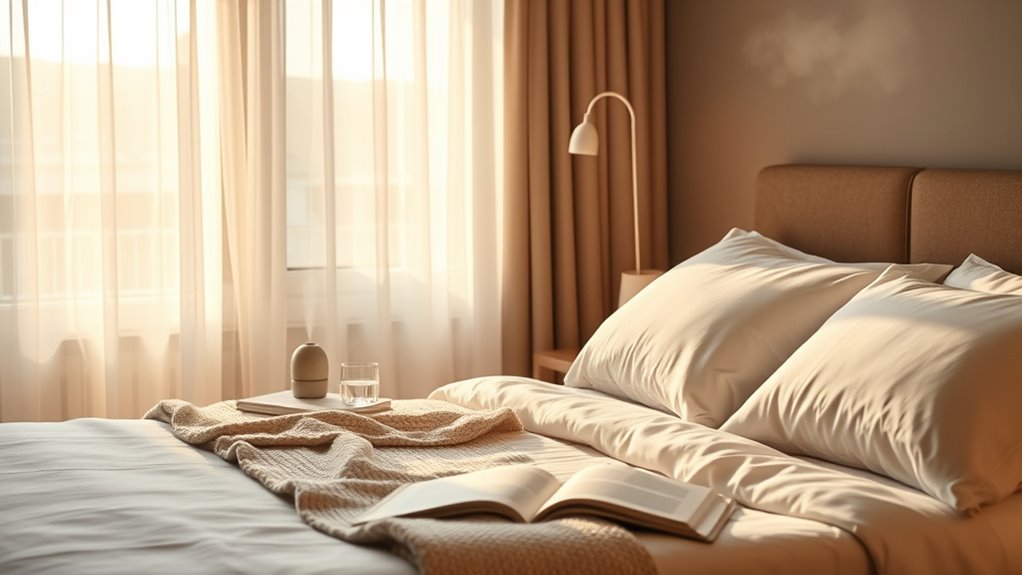To stop guessing about sleep, focus on establishing a consistent schedule by going to bed and waking up at the same times daily, which helps regulate your internal clock. Create a relaxing environment with blackout curtains, cool temperatures, and calming scents like lavender. Develop calming routines like reading or listening to soothing music before bed. Manage light and noise by using blackout curtains and white noise machines. Avoid caffeine, heavy meals, and screens before sleeping. Keep learning to master your sleep habits.
Key Takeaways
- Establish a consistent sleep schedule by going to bed and waking up at the same times daily.
- Create a restful environment with blackout curtains, comfortable bedding, and calming scents like lavender.
- Develop relaxing bedtime routines such as reading, deep breathing, or listening to soothing music.
- Manage light and noise by using blackout curtains and white noise machines to promote melatonin production.
- Avoid stimulants like caffeine and heavy meals before bed to prevent sleep disruptions and improve sleep quality.
Setting a Consistent Sleep Schedule
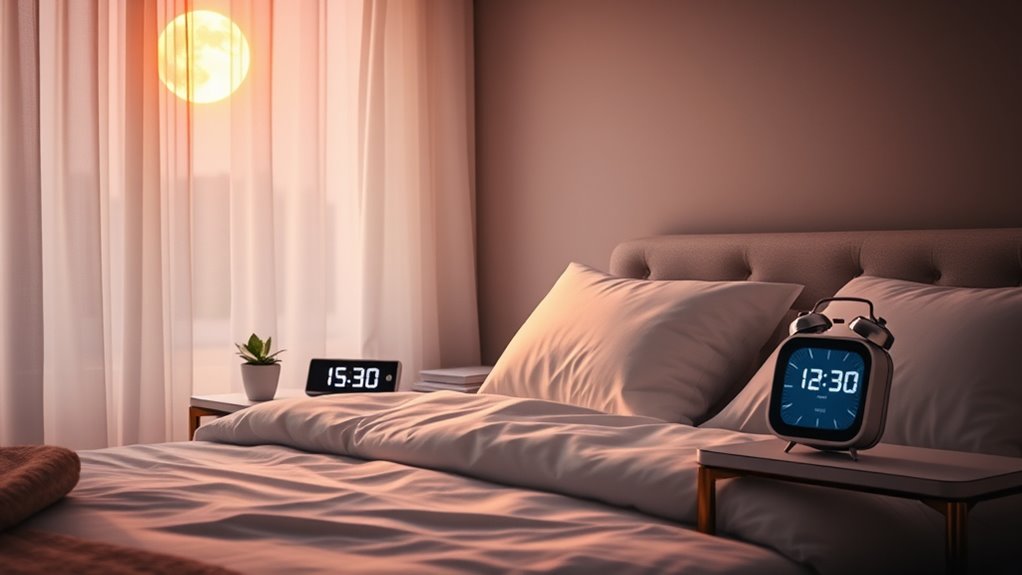
Establishing a consistent sleep schedule is one of the most effective ways to improve your sleep quality. When you go to bed and wake up at the same times each day, your body’s internal clock stays in sync, making it easier to fall asleep and wake refreshed. To track your progress, consider sleep tracking devices or apps that monitor your sleep patterns overnight. Additionally, dream journaling can help you become more aware of your sleep cycles and dream recall, providing insight into your sleep quality. Incorporating eye patch benefits into your routine can also help reduce puffiness and dark circles, contributing to a more refreshed appearance in the morning. By maintaining regular sleep and wake times, you support your body’s natural rhythms, reduce sleep disruptions, and create a stable routine that promotes better rest and overall health.
Creating a Restful Sleep Environment
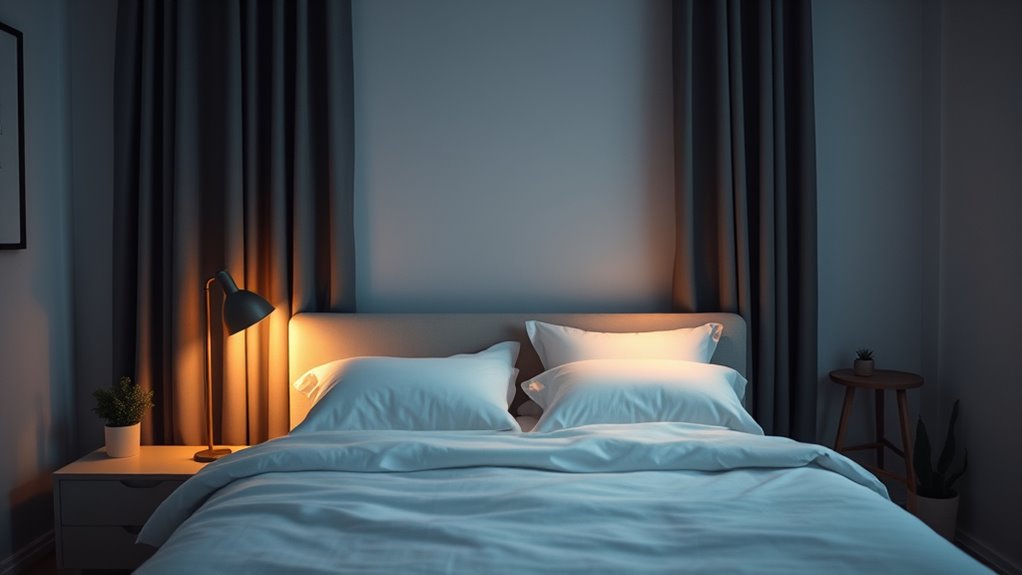
Creating a restful sleep environment is essential for improving your sleep quality. Start by optimizing your bedroom as a sanctuary for rest. Use sleep environment accessories like blackout curtains, white noise machines, or a comfortable mattress and pillows to reduce distractions and promote relaxation. Keeping the room cool and dark helps signal your body that it’s time to wind down. To encourage dream incubation, consider adding calming scents like lavender or using gentle lighting before bed. Avoid clutter and electronic devices that can interfere with sleep cues. A well-designed sleep space makes it easier to fall asleep and stay asleep, creating a peaceful atmosphere that supports restorative rest. Incorporating sleep-friendly decor can further enhance your environment and promote better sleep habits. When your environment is conducive to sleep, you’ll wake feeling more refreshed and ready for the day.
Developing Relaxing Bedtime Routines

Developing relaxing bedtime routines can considerably improve your ability to fall asleep and enjoy restorative rest. Establishing calming pre-sleep activities signals your body that it’s time to wind down. Incorporate bedtime aromatherapy with essential oils like lavender to promote relaxation. Keep activities gentle and consistent to create a predictable pattern. Consider these calming activities:
Creating a soothing bedtime routine helps signal your body to relax and prepare for restful sleep.
- Reading a book in dim lighting
- Practicing deep breathing or meditation
- Listening to soothing music
- Taking a warm, relaxing bath
- Using bedtime aromatherapy to enhance tranquility
- Incorporating aromatherapy for sleep to further enhance relaxation.
Managing Light and Noise for Better Sleep
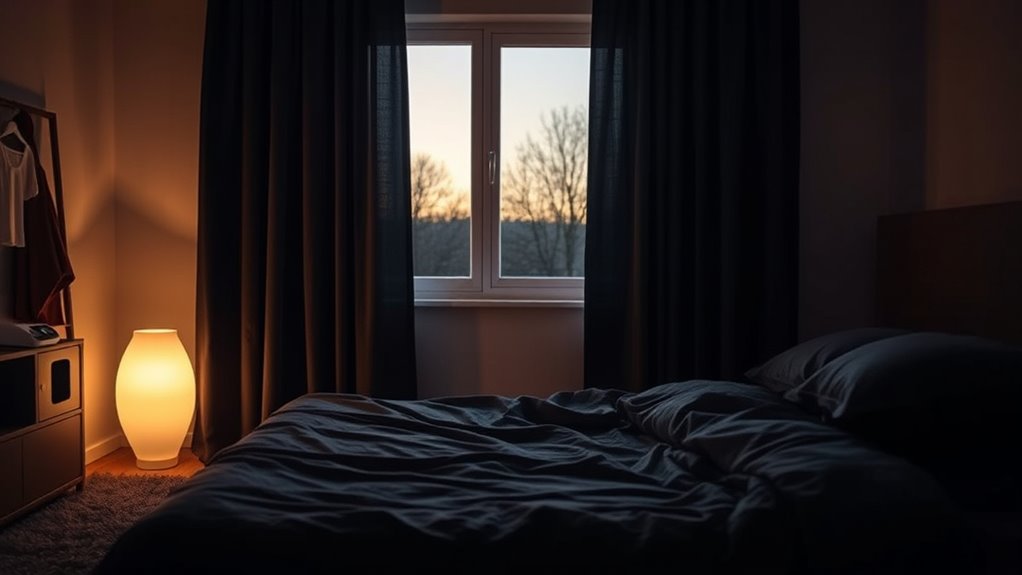
Managing light and noise is essential for achieving restful sleep because both can profoundly disrupt your ability to fall asleep and stay asleep. Light exposure, even at low levels, signals your brain that it’s time to wake up, making it harder to drift off. Install light blocking curtains to create a dark environment that promotes melatonin production. Noise can also interfere with your sleep cycles, causing frequent awakenings. Using white noise machines can mask disruptive sounds and help you relax. Keep your bedroom as quiet and dark as possible to enhance sleep quality. Avoid bright screens before bed, and consider blackout curtains or earplugs if external noise is an issue. Properly managing light and noise sets the stage for a more restful, uninterrupted night’s sleep. Additionally, choosing the right projector technology can help create a calming environment if you enjoy relaxing visuals before sleep.
Avoiding Stimulants and Heavy Meals Before Bed
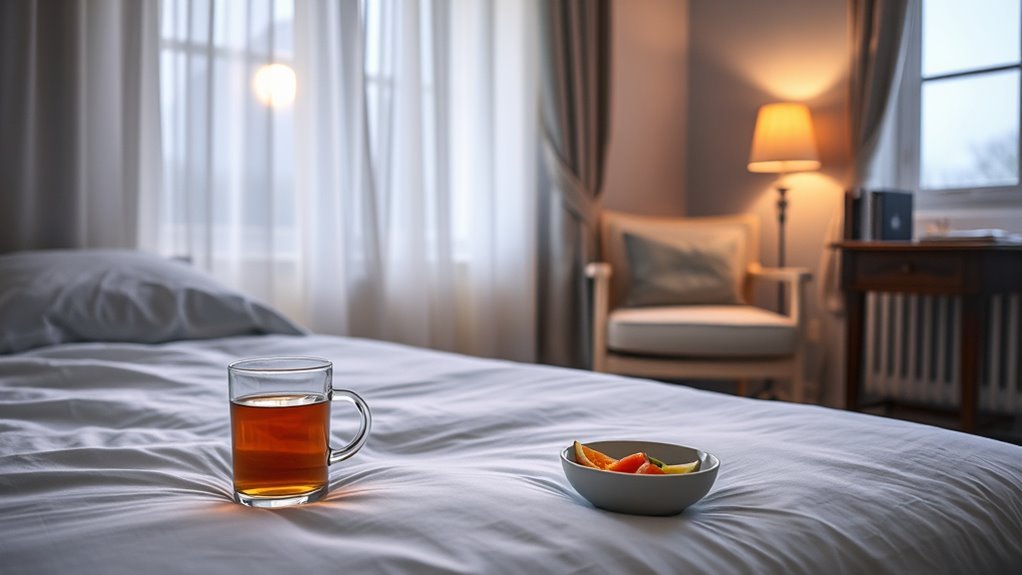
Consuming stimulants like caffeine or nicotine close to bedtime can interfere with your ability to fall asleep because these substances increase alertness and block the sleep-promoting effects of melatonin. To improve sleep hygiene, avoid caffeine consumption in the late afternoon or evening. Similarly, steer clear of heavy meals before bed, as they can cause discomfort and indigestion, making it harder to fall asleep. Here are some tips to help you:
- Cut off caffeine by early afternoon
- Opt for light, easily digestible snacks if hungry
- Finish heavy meals at least 2-3 hours before bedtime
- Choose herbal teas instead of caffeinated drinks
- Keep late night eating minimal to prevent sleep disruptions
Frequently Asked Questions
How Long Does It Typically Take to See Improvements From Sleep Hygiene Changes?
You can typically notice improvements in your sleep quality and daytime alertness within a week of consistently practicing good sleep hygiene. Changes like sticking to a regular sleep schedule, avoiding screens before bed, and creating a relaxing environment help your body adjust faster. However, for some, it might take up to two weeks or more to see significant benefits. Stay patient and consistent to achieve the best results.
Can Sleep Hygiene Tips Help With Chronic Insomnia?
Yes, sleep hygiene tips can help with chronic insomnia. Improving your sleep environment by keeping it dark, quiet, and cool, along with establishing consistent bedtime routines, can markedly enhance your sleep quality. These habits reduce anxiety around sleep and signal your body it’s time to rest. While results vary, many find that sticking to these routines leads to better sleep over time, even with chronic issues.
Are There Specific Sleep Hygiene Strategies for Shift Workers?
Did you know that about 20% of the workforce works in shifts, facing unique sleep challenges? As a shift worker, you can improve sleep hygiene by creating a dark, quiet sleep environment and sticking to a consistent schedule, even on days off. To better adjust your circadian rhythm, try exposing yourself to bright light during your shift and avoiding screens before bed. These strategies help combat shift work challenges effectively.
How Does Sleep Hygiene Affect Mental Health and Mood?
Good sleep hygiene directly impacts your mental health and mood by improving your sleep quality. When you establish consistent routines, limit screen time before bed, and create a restful environment, you help reduce stress and anxiety. Better sleep allows your brain to recover and process emotions effectively. As a result, you’ll wake up feeling more balanced, alert, and positive, making it easier to handle daily challenges and maintain overall mental well-being.
Can Sleep Hygiene Practices Prevent Future Sleep Disorders?
You can prevent future sleep disorders by maintaining good sleep hygiene, including consistent bedtime routines and optimizing your bedroom environment. While it might seem like small changes won’t make a difference, these habits promote better sleep quality over time. By sticking to a regular sleep schedule and creating a calming environment, you reduce the risk of developing issues like insomnia, ensuring healthier sleep patterns long-term.
Conclusion
By following these sleep hygiene tips, you’ll improve your sleep quality and wake up refreshed. Did you know that consistent sleep schedules can boost your overall sleep quality by up to 25%? Remember, small changes like managing light, noise, and avoiding stimulants can make a big difference. Don’t guess—prioritize your sleep health and enjoy the benefits of restful nights and energized days!
